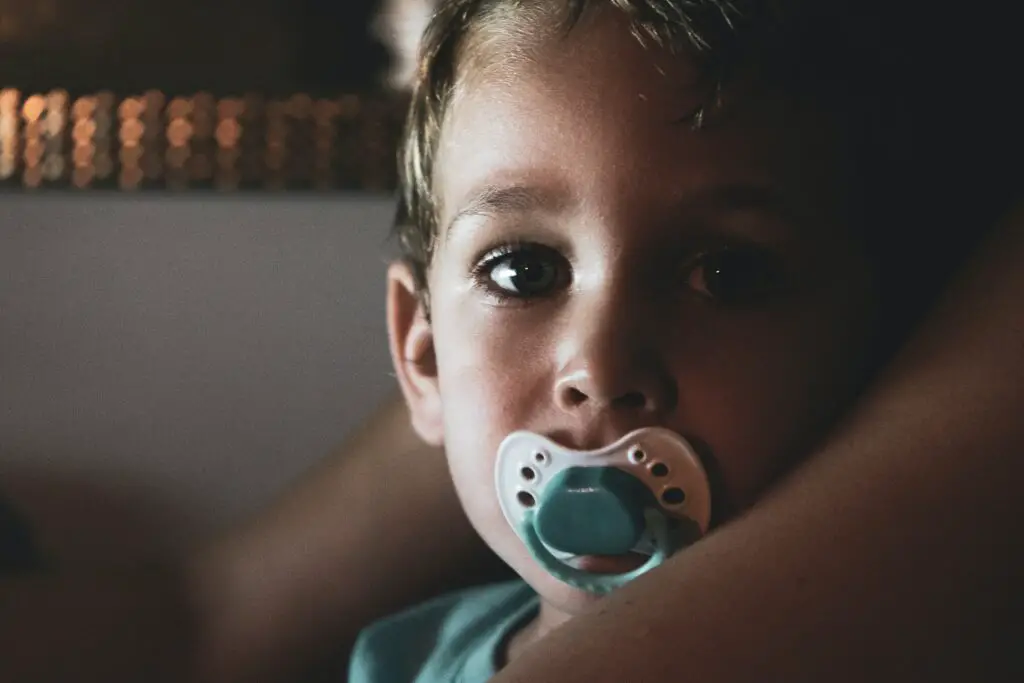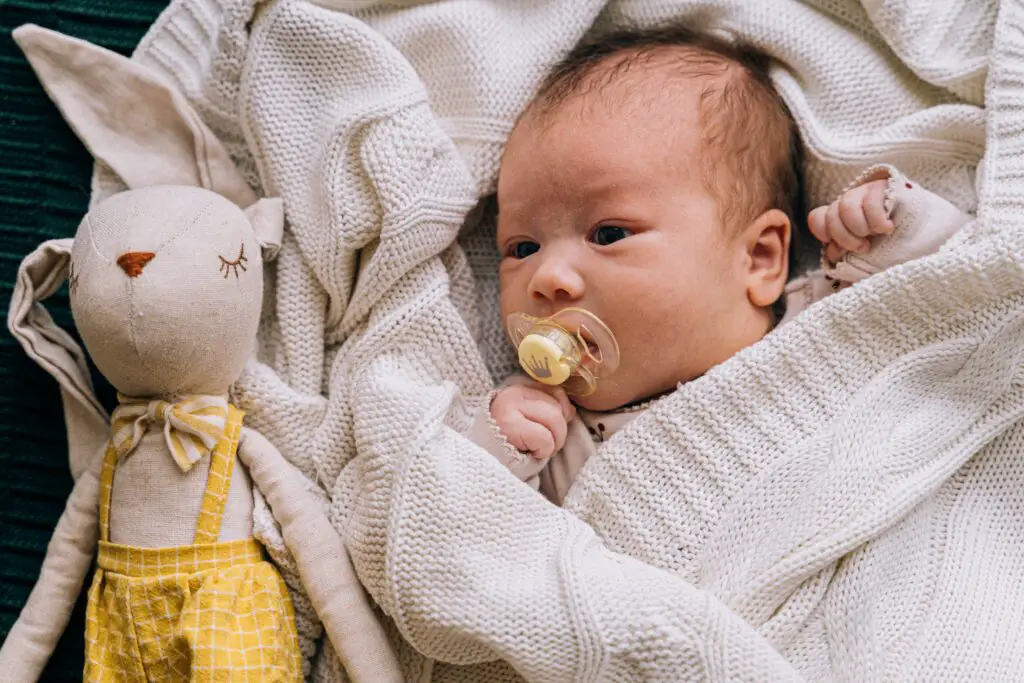Introduction: Newborn Sleep Habits
Welcoming a newborn into your family is a joyous occasion, but it also comes with its fair share of challenges. One of the most common concerns for new parents is understanding and managing their baby’s sleep habits. In this section, we will delve into the fascinating world of newborn sleep patterns and the importance of safe sleep practices.
Understanding Newborn Sleep Patterns
Newborns have a very different sleep schedule compared to adults. They sleep in cycles of about 2-3 hours throughout the day and night, waking up frequently for feedings. This is because their tiny tummies can’t hold enough food to keep them satisfied for long periods. As they grow and their stomachs can hold more food, they will start to sleep for longer stretches.
It’s also important to note that newborns spend more time in REM (Rapid Eye Movement) sleep, which is a lighter stage of sleep. This is why they may seem to wake up easily. Don’t worry, this is completely normal and necessary for their brain development. Learn more about REM sleep here.
Importance of Safe Sleep Practices for Newborns
Ensuring your baby is sleeping safely is crucial to reduce the risk of Sudden Infant Death Syndrome (SIDS). Here are some key safe sleep practices:
-
-
- Always place your baby on their back to sleep, not on their stomach or side.
- Use a firm sleep surface, such as a mattress in a safety-approved crib, covered by a fitted sheet.
- Keep soft objects, toys, and loose bedding out of your baby’s sleep area.
- Do not let your baby sleep in an adult bed, on a couch, or on a chair alone, with you, or with anyone else.
-
These practices can significantly decrease the risk of SIDS and other sleep-related causes of infant death. Learn more about SIDS here.

Benefits of Pacifiers for Newborns
As a parent, you may be wondering about the benefits of pacifiers for your newborn. There are several reasons why pacifiers can be beneficial, especially in the early months of your baby’s life. Let’s delve into some of these benefits.
Pacifiers and SIDS prevention
One of the most significant benefits of pacifiers is their potential role in reducing the risk of Sudden Infant Death Syndrome (SIDS). According to the American Academy of Pediatrics, using a pacifier during sleep can decrease the risk of SIDS by up to 50%. The exact reason for this is not known, but it is believed that pacifiers may help keep the airways open by pushing the tongue forward.
How pacifiers can aid in newborn sleep
Pacifiers can also aid in newborn sleep. Many babies have a strong need to suck, which is not only linked to food intake but also to a sense of security and comfort. Providing a pacifier can help satisfy this need, helping your baby to relax and fall asleep more easily. However, it’s important to note that pacifiers should be introduced only after breastfeeding has been well established to avoid nipple confusion.
Case study: The impact of pacifiers on newborn sleep patterns
A study published in the Journal of Pediatrics found that babies who used pacifiers had more consolidated sleep and less fragmented sleep than those who did not. This means that they slept for longer periods without waking up, which can be beneficial for both the baby and the parents. However, the researchers also noted that pacifier use should be balanced with other considerations, such as the potential for dental issues later in life.
In conclusion, while pacifiers are not necessary for every baby, they can provide several benefits, particularly in terms of sleep and SIDS prevention. As with all parenting decisions, it’s important to weigh the pros and cons and make the choice that’s best for your family.
Pacifier Safety for Infants
Ensuring the safety of your infant is paramount, and this includes the use of pacifiers. Let’s delve into the safe use of pacifiers in newborns.
Pacifier Use in Newborns
Introducing a pacifier to a newborn can be a daunting task for new parents. Here are some key points to consider:
1. When to introduce a pacifier
According to the American Academy of Pediatrics, it is safe to introduce a pacifier to your newborn after breastfeeding is well established, typically around 3-4 weeks old. This helps avoid any confusion between the pacifier and the mother’s nipple.
2. How to introduce pacifier to newborn
When introducing a pacifier, ensure your baby is in a calm state. Try offering the pacifier when your baby is settling down for sleep or during a time of quiet alertness. Remember, it’s important not to force the pacifier. If your baby resists, try again another time.
3. Choosing the right pacifier
Not all pacifiers are created equal. Choose a one-piece, dishwasher-safe pacifier to ensure cleanliness. The shield should be at least 1.5 inches across, so it can’t be swallowed. Also, look for a pacifier with ventilation holes in the shield, as they allow air passage. This is important if the pacifier accidentally becomes lodged in the mouth.
Remember, while pacifiers can be a helpful tool for parents, they should never replace meals or be used to delay feeding times. Always monitor your baby while they are using a pacifier and remove it while your baby is sleeping.

Pacifier Pros and Cons
- Benefits of Pacifier Use
Using a pacifier can provide numerous benefits for your newborn. Firstly, pacifiers have been linked to a reduced risk of Sudden Infant Death Syndrome (SIDS). This is because pacifiers keep babies from falling into a deep sleep, which can be dangerous for newborns. Additionally, pacifiers can help soothe a fussy baby, providing a source of comfort and security. They can also assist in developing the sucking reflex, which is crucial for feeding.
- Potential Drawbacks and How to Mitigate Them
Despite the benefits, there are potential drawbacks to pacifier use. One concern is that pacifiers can interfere with breastfeeding, leading to nipple confusion. To mitigate this, it’s recommended to introduce a pacifier only after breastfeeding has been well established. Another potential issue is the risk of ear infections. To reduce this risk, ensure the pacifier is always clean and replace it regularly. Lastly, prolonged pacifier use can lead to dental problems. To prevent this, consider using an orthodontic pacifier and aim to wean your child off the pacifier by the age of two.
Newborn Sleep Tips
Sleep is crucial for the healthy development of your newborn. Here are some tips to help your baby get the sleep they need:
1. Creating a sleep-friendly environment
Creating a sleep-friendly environment is the first step towards ensuring your baby gets good sleep. This involves making sure the room is quiet, dark, and at a comfortable temperature. According to the American Academy of Pediatrics, the ideal room temperature for a newborn is between 68 and 72 degrees Fahrenheit. Using a white noise machine can also help drown out any disruptive noises.
2. Establishing a sleep routine
Establishing a consistent sleep routine can help signal to your baby that it’s time to sleep. This could involve a bath, a bedtime story, or a lullaby. The key is consistency. According to a study published in the Journal of Pediatric Psychology, babies who follow a consistent bedtime routine go to sleep easier, sleep better, and cry less during the night.
3. Understanding and responding to sleep cues
Every baby is different, but common sleep cues include rubbing eyes, yawning, and becoming fussy. By understanding and responding to these cues, you can help your baby get to sleep before they become overtired, which can make it harder for them to fall asleep.
Remember, it’s normal for newborns to have irregular sleep patterns. It’s important to be patient and flexible. With time, your baby will develop a more predictable sleep schedule.
Conclusion: Safe Sleep Practices for Newborns
As we wrap up this comprehensive guide on newborn sleep habits and pacifier use, it’s essential to revisit the key points we’ve discussed. The goal is to ensure that your little one enjoys a safe, comfortable, and restful sleep. Let’s take a moment to review the main takeaways and final thoughts on safe sleep practices.
- Key takeaways on pacifier use and newborn sleep
Pacifiers can be a beneficial tool in helping your newborn sleep. They provide a soothing effect, which can help your baby fall asleep faster and stay asleep longer. However, it’s crucial to ensure that the pacifier is used safely. Always check the pacifier for wear and tear, never tie it around your baby’s neck, and avoid sweetening it. Remember, it’s recommended to wait until breastfeeding is well established before introducing a pacifier, typically around 3-4 weeks old. [source]
- Final thoughts on safe sleep practices
When it comes to safe sleep practices, always place your baby on their back to sleep, in a crib or bassinet with a firm mattress. Keep the sleep area free of pillows, blankets, and toys to reduce the risk of SIDS. Room-sharing without bed-sharing is recommended for at least the first six months. Regular sleep routines and a quiet, dark sleep environment can also promote better sleep. [source]
In conclusion, understanding and implementing safe sleep practices for your newborn is crucial. It not only ensures their safety but also promotes their overall health and development. As parents, it’s our responsibility to provide a safe and nurturing environment for our little ones to grow and thrive. Remember, every baby is unique, and what works for one may not work for another. Always consult with your pediatrician if you have any concerns or questions about your baby’s sleep habits or pacifier use.














